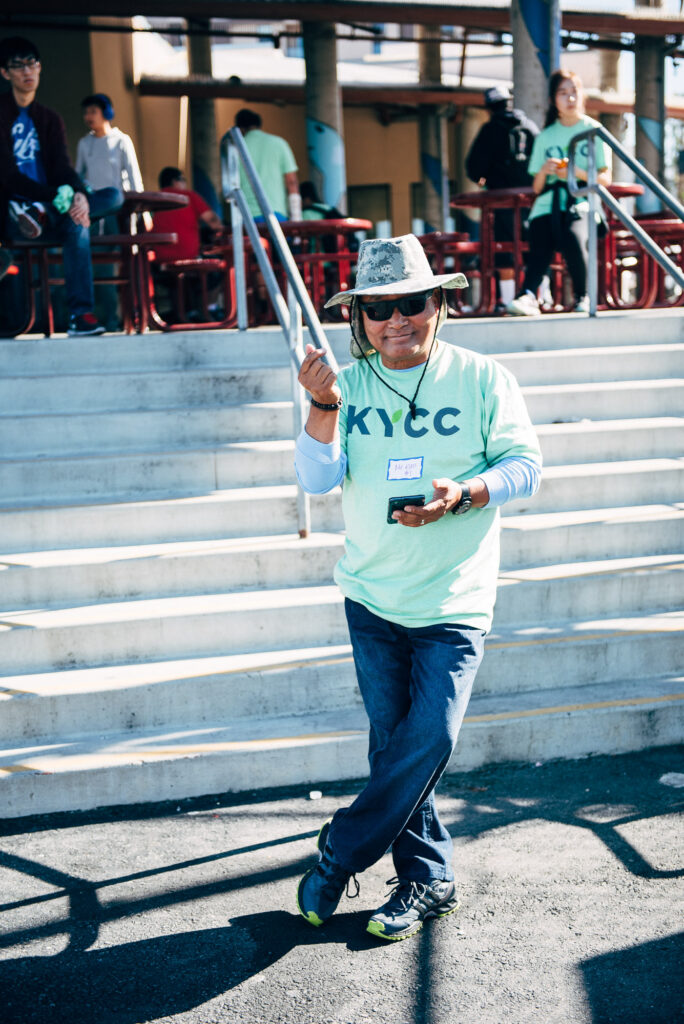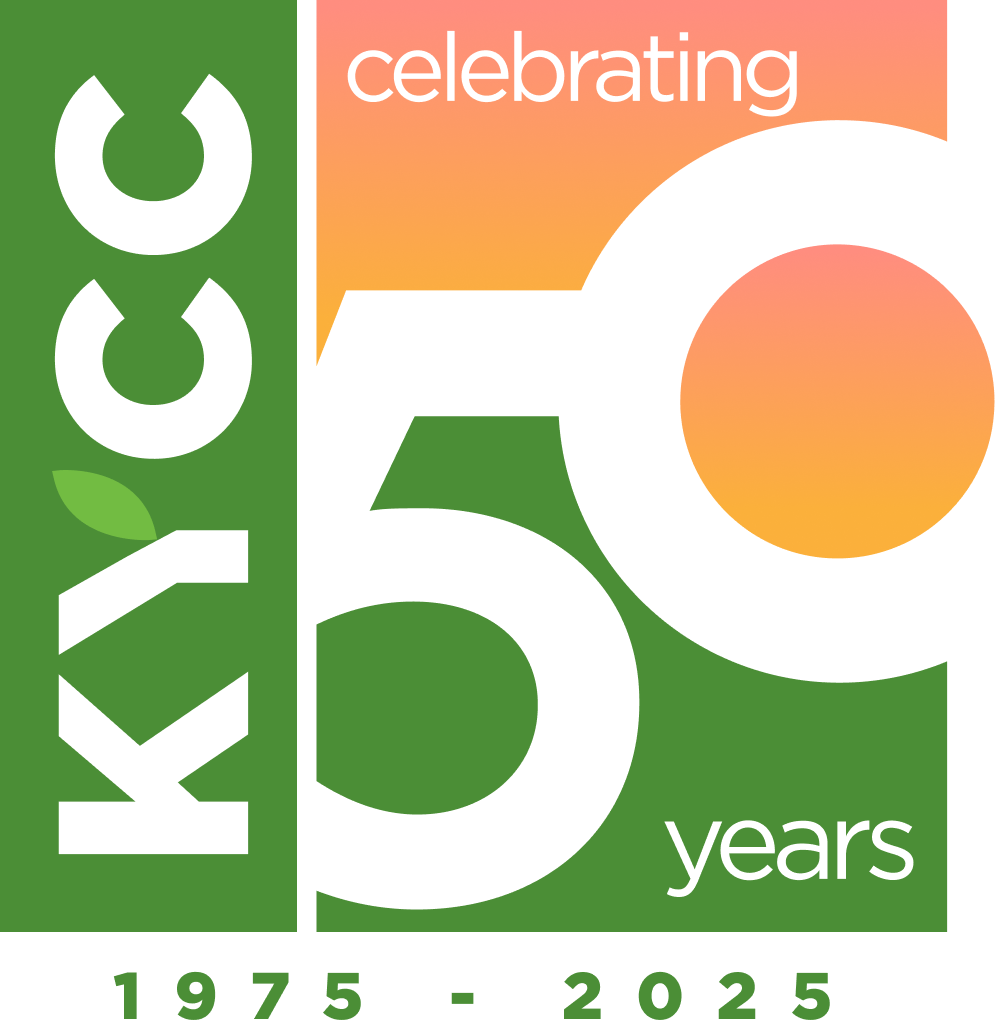August 24, 2017
Koreatown’s Small Business Ally—Myung Andy Kim Boosts Mom-and-Pop Businesses, Entrepreneurs
It’s lunchtime at Kaju Kimbap, a small, busy restaurant on the first floor of the recently revamped California Market grocery on Fifth Street and Western Avenue in Koreatown. KYCC Small Business Counselor Myung “Andy” Kim stops by for his regular check-in with the owner, Young Nam Moon, to see how business is faring.
“He made suggestions on how to treat our customers better,” Ms. Moon explained. “And now we’re seeing them return again and again. It has helped our business tremendously.”
As part of KYCC’s Community Economic Development’s Small Business Program, Mr. Kim, 68, hits the streets of Koreatown three times a week, reaching up to 10 businesses a day. He knocks on doors and walks into restaurants, meeting the mom-and-pop owners that are the heart of K-Town’s business community. In total, he has face-to-face meetings with over 90 brick-and-mortar clients.
KYCC’s Community Economic Development was founded in 1992, in the wake of the Los Angeles Riots that devastated the Korean business community. Over 1,100 businesses—many of them Korean-owned—were destroyed by looting or arson. At the time, KYCC’s CED provided immediate logistical, legal and financial assistance, the foundation for our program to this day.
Today, Mr. Kim runs the Small Business Program, which provides workshops and one-on-one counseling for Korean American and Koreatown businesses. As part of the Asian Pacific Islander Small Business Program, KYCC is funded by the Small Business Administration (SBA) and local and national banks to deliver expert guidance on how to start, manage and grow businesses.
In person, Mr. Kim offers business advice from employee management to catering tips, and educates entrepreneurs on labor and tax laws and city permits.
“He was so encouraging, always telling me not to be afraid,” Ms. Moon says. “As a business owner, I gained so much confidence from him.”
Expanding our reach
Throughout the week, Mr. Kim collaborates with two other KYCC programs—Prevention Education and Environmental Services—to maximize the multiservice agency’s impact. With Prevention Education, a substance abuse prevention program, Mr. Kim outreaches with our community organizers when they meet with liquor store owners and small markets. He also joins our Environmental Services team, in their effort to plant shade trees in front of storefronts.

“KYCC has over two dozen programs across many different units. Each is focused on their own priority area, whether it is mental health, community beautification or economic development,” explains Rick Kim, KYCC Assistant Director of Community Economic Development Services.
“By focusing on the client—in this case, many of whom are immigrant entrepreneurs—and by sharing information on all that we have to offer, Mr. Kim has greatly expanded KYCC’s ability to educate and provide quality services to those in need.”
Starting this month, Mr. Kim will be the Korean-speaking liaison to the Western Avenue businesses for the City of Los Angeles Great Streets Initiative. In partnership with the Mayor’s Office and City Council, Great Streets seeks to “provide economic revitalization, increase public safety, enhance local culture, and support great neighborhoods.”
He will approach the Korean owners of Western Ave. businesses—furniture stores, flower shops, restaurants—from Melrose Avenue to 3rd Street, to share small business technical assistance resources and community beautification efforts, such as sidewalk and facade improvements, and tree plantings.
Changing landscape of Koreatown
On a Thursday evening, the conference room in KYCC’s administrative office is teeming with entrepreneurs, who are busily taking notes. Mr. Kim is at the front of the room, leading a Powerpoint presentation on social media marketing.
Twice a year, KYCC offers a Small Business workshop series, the Entrepreneur Training Program (ETP) where industry professionals, such as bankers, CPAs and attorneys, coach startup entrepreneurs and business owners on better operations and practices.
Workshop topics have included “Access to Capital,” “How to Use Credit” and “Starting a Franchise.” Additional information on permits—retail, building, health department—and additional resources are offered. This year alone, over 50 entrepreneurs have attended ETP workshops.
Citing the recent development boom in Koreatown, Mr. Kim reflects on the changing landscape of business owners and residents in the area. “My generation has to change,” he notes. “They believe in the old work-hard-make-money mindset, but my job is to help them adjust their perspective and understand the system.”
He notices many success stories among the younger, 1.5 and second generation business owners, many of whom are taking over the family business from their retiring parents. More attuned to mainstream tastes and demands, they are opening franchises and catering to a multicultural clientele.
Unlike his generation, Mr. Kim is fast to adapt. Earlier this year, he invited Van Dyke Coffee Roasters to lead a workshop on how to run a coffeeshop. Over 25 aspiring café owners visited the store in Buena Park for a bean roasting tutorial and free barista workshops. Mr. Kim has also brought in the owners from local trendsetting enterprises Cafe Dulce, Cafe Mak, Echo Eats and Poke Place to relate their success stories, inspiring a new generation of Koreatown business owners.
“My role is to help the Korean small business community, but I can’t just think about Koreans,” Mr. Kim says. “I have to think about the entire customer base of all of my clients. Koreatown businesses’ chance for survival will be greater if we move and change together.”

